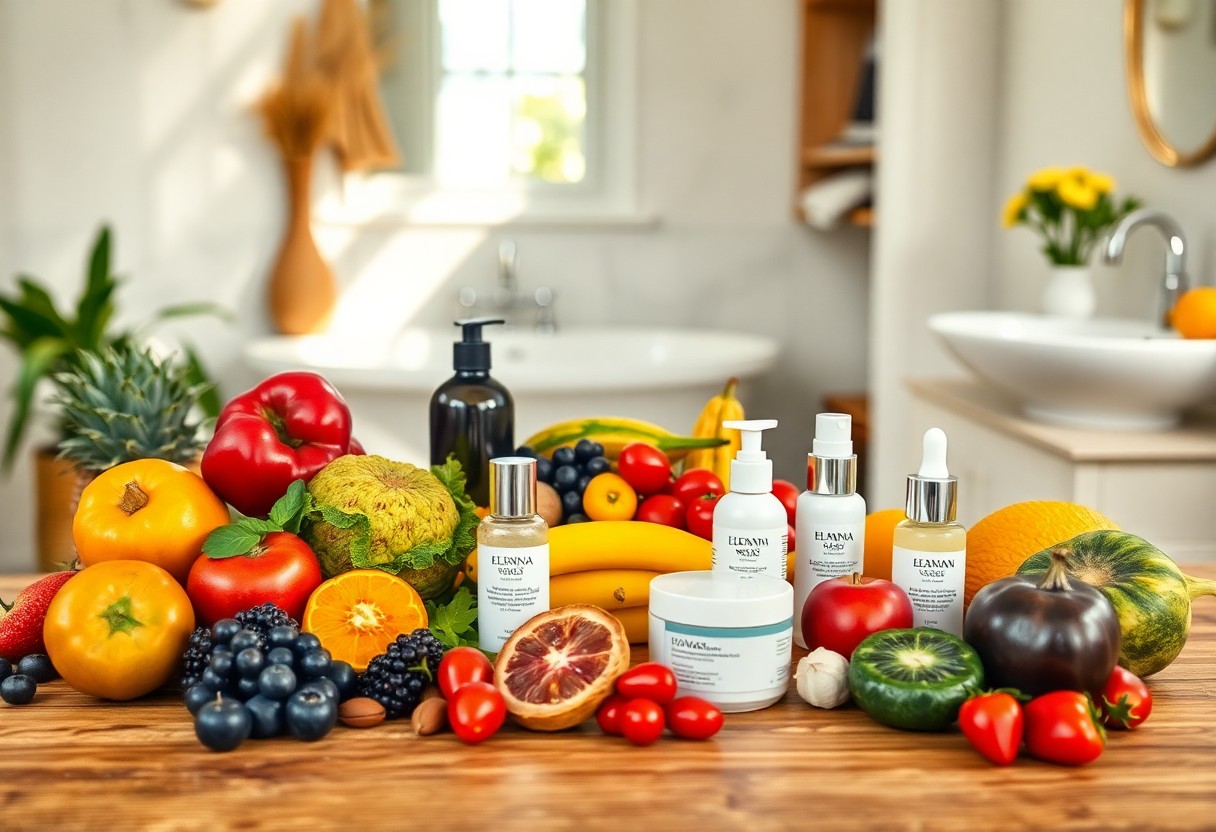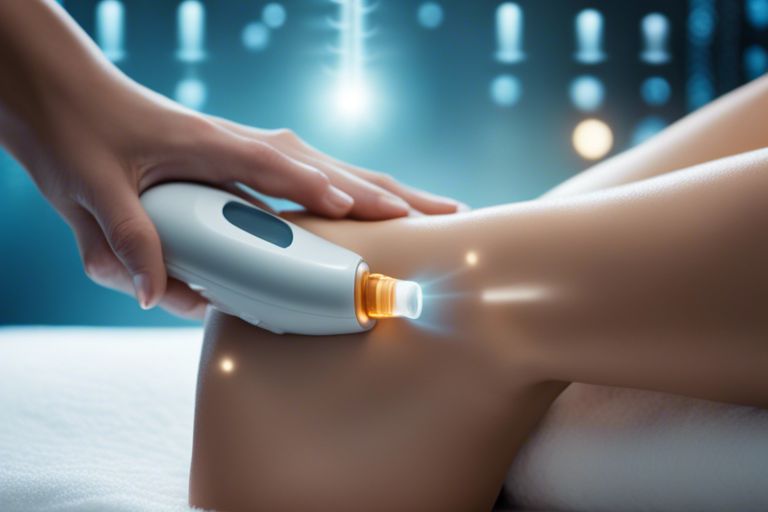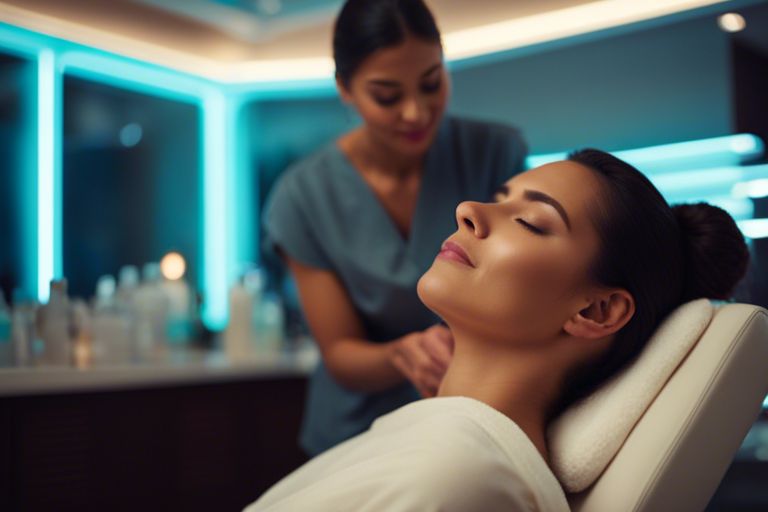Diet plays a significant role in the health and appearance of your skin. By understanding the connection between what you eat and your skincare routine, you can create a holistic approach that promotes a radiant complexion. In this guide, you’ll discover how to integrate nutritional choices with effective skin care practices to achieve lasting results. From selecting skin-friendly foods to the best topical treatments, you’ll be equipped to transform your skin from the inside out.
The Skin-Diet Connection: How Your Plate Affects Your Complexion
Your diet directly influences your skin’s vitality and resilience. Foods rich in antioxidants, healthy fats, and vitamins contribute to a radiant complexion, while a lack of vital nutrients can reveal itself through dullness, acne, or premature aging. Consuming a variety of whole foods—such as fruits, vegetables, whole grains, and lean proteins—fuels your body and nourishes your skin from the inside out, establishing a beautiful synergy between what you eat and how you look.
Nutrients That Nourish: Key Vitamins and Minerals for Skin Health
The Impact of Sugar and Processed Foods on Skin Aging
Superfoods for Radiant Skin: What to Eat for a Glowing Complexion
Integrating superfoods into your diet can be a game-changer for achieving radiant skin. Foods rich in vitamins, minerals, and phytonutrients not only support overall well-being but also nourish and rejuvenate your skin from the inside out. By incorporating a variety of colorful fruits, vegetables, whole grains, and healthy fats, you can create a powerful synergy that promotes a glowing complexion and combats signs of aging.
Antioxidant Powerhouses: Berries, Leafy Greens, and Beyond
Berries like blueberries, strawberries, and raspberries are packed with antioxidants that help protect your skin from oxidative stress. Leafy greens, including spinach and kale, provide necessary vitamins such as A, C, and K, which reinforce skin health and encourage cell regeneration. These vibrant foods combat free radicals, giving your skin a youthful and radiant glow, making them perfect additions to your daily meals.
Healthy Fats and Their Role in Skin Hydration
Healthy fats are necessary for maintaining skin hydration and elasticity. Foods such as avocados, walnuts, and fatty fish like salmon provide omega-3 fatty acids, which support your skin’s natural barrier and help seal in moisture. Incorporating these fats into your meals not only enhances your skin’s texture but also defends against environmental stressors that can lead to dryness and irritation.
Regular consumption of healthy fats is vital for achieving and maintaining hydrated skin. For instance, avocados are rich in monounsaturated fats and act as a natural moisturizer, while walnuts provide a good balance of omega-3 and omega-6 fatty acids, necessary for skin health. Fatty fish such as salmon offer a hearty dose of DHA and EPA, omega-3s linked to reduced inflammation and better skin barrier function. Aim to include these nutrient-dense fats in your diet several times a week to support a plump and glowing complexion.
Customized Diet Plans: Tailoring Your Nutrition for Specific Skin Concerns
Your skin’s unique challenges often require a customized nutritional approach. By identifying specific skin concerns such as acne, dryness, or aging, you can tailor your diet to better support healthy, vibrant skin. This targeted nutrition enables you to nourish your body with the right foods that not only promote desired results but also enhance your overall well-being.
Acne: Foods to Embrace and Avoid
In managing acne, focus on foods rich in omega-3 fatty acids, such as salmon and walnuts, which can help reduce inflammation. Incorporating high-fiber foods like fruits, vegetables, and whole grains also aids in maintaining stable blood sugar levels, which is crucial for skin health. On the flip side, steer clear of excessive dairy products and high glycemic index foods, as these can exacerbate breakouts.
Aging Skin: Nutritional Strategies for Youthful Glow
To combat signs of aging, prioritize antioxidants, healthy fats, and hydration. Consuming berries, leafy greens, and avocados provides vital nutrients that combat oxidative stress. Additionally, stay hydrated with adequate water intake and consider collagen-boosting foods like bone broth. These strategies work synergistically to promote skin elasticity and reduce fine lines, helping you maintain a more youthful appearance.
Including specific nutrients like vitamin C and E can significantly enhance your skin’s resilience against aging. Vitamin C, found abundantly in citrus fruits and bell peppers, helps in collagen production, which is vital for skin firmness. Vitamin E, available in foods such as nuts and seeds, acts as a powerful antioxidant, protecting skin cells from damage caused by free radicals. Incorporating a variety of these foods into your daily meals creates a robust defense against premature aging, giving your skin the vibrant glow it deserves.
Skincare Regimens That Complement a Healthy Diet
Integrating skincare regimens with a healthy diet can enhance your skin’s health significantly. Focus on products rich in antioxidants, vitamins, and natural ingredients that nourish your skin from the outside while your nutritious foods work from the inside. Consistency is key; using tailored products regularly helps to build a protective barrier and combat environmental stressors, leading to a radiant complexion over time. Formulations with ingredients like hyaluronic acid, vitamin C, and imperative oils can effectively complement the benefits of your diet, providing hydration, brightening, and overall rejuvenation.
Building a Routine: Essential Products and Their Benefits
Creating a skincare routine involves selecting imperative products that address your skin concerns effectively. A gentle cleanser removes impurities without stripping your skin’s natural moisture, while a toner helps restore pH balance. Incorporating a serum packed with vitamins, such as C for brightening or E for protection, boosts your routine’s effectiveness. Finally, a moisturizer tailored to your skin type locks in hydration, and, importantly, a broad-spectrum sunscreen shields your skin from harmful UV rays, preventing premature aging and maintaining an even tone. Tailored use of these products can maximize the benefits of your healthy diet.
DIY Treatments: Kitchen Ingredients That Transform Skin
Kitchen ingredients can be surprisingly effective for DIY skincare treatments. Items like honey, oatmeal, yogurt, and avocado offer unique properties that enhance skin health. Honey acts as a natural humectant, helping to maintain moisture, while oatmeal soothes irritation and provides gentle exfoliation. Yogurt, rich in lactic acid, brightens and smooths the skin, and avocado nourishes with healthy fats. Creating face masks or scrubs with these ingredients not only promotes skin health but also aligns with your dietary choices, reinforcing the impact of good nutrition on your outer appearance.
Exploring kitchen ingredients for DIY treatments can be an enjoyable and rewarding endeavor. For example, a simple honey and oatmeal mask can soothe and hydrate dry skin. Mix equal parts of honey and ground oatmeal, apply to your face, and let it sit for 15 minutes before rinsing off. Alternatively, a yogurt and avocado mask combines the skin-brightening properties of yogurt with the nourishing effects of avocado for a deep conditioning treatment. Incorporating these homemade remedies into your regimen allows you to harness the power of natural foods, giving you not just inner nourishment but also outer radiance.
Long-Term Strategies for Radiant Skin: Habits for Sustainable Results
Radiant skin thrives on long-term commitment to both diet and skincare. Establishing daily routines that prioritize nutritious foods and effective skin treatments fosters sustainable results. Aim for a balanced intake of vitamins, minerals, and antioxidants while maintaining a consistent skincare regimen tailored to your skin type. By cultivating healthy habits, you create an environment where your skin can flourish, leading to a vibrant complexion and lasting confidence.
Consistency is Key: Revealing the Importance of Routine
Creating a consistent routine is vital for seeing improvements in your skin’s appearance. Daily application of your chosen skincare products, combined with a balanced diet rich in skin-friendly nutrients, can support your skin’s natural processes. Treat your routines as sacred rituals, committing to them regularly to maximize the benefits and enjoy a more resilient complexion over time.
Mindfulness and Stress Management: Their Impact on Skin Health
Mindfulness and stress management practices directly influence your skin’s health. Elevated stress levels trigger hormonal fluctuations, which can lead to breakouts and other skin issues. Incorporating techniques like meditation, yoga, or deep-breathing exercises helps reduce stress, allowing your skin to heal and thrive. When you prioritize mental well-being, you create a positive ripple effect on your skin’s appearance.
Stress not only affects your overall well-being but sends signals to your skin that may accelerate conditions such as eczema, acne, and psoriasis. Engaging in mindfulness activities such as journaling can provide clarity and help you process emotions, making it easier to maintain a balanced state of mind. Integrating vital oils known for relaxation, like lavender, into your skincare routine can create a soothing experience, reinforcing the mind-skin connection. Adopting stress management techniques enhances not only your skin’s health but also boosts your overall happiness and life satisfaction.
To wrap up
Conclusively, combining a balanced diet with a tailored skincare regimen can significantly enhance your skin’s health and appearance. By prioritizing nutrient-rich foods, staying hydrated, and selecting products suited to your specific skin type, you create a synergistic effect that promotes lasting results. Regularly assess how your dietary choices and skincare products interact, making adjustments as needed to optimize benefits. This holistic approach not only fosters a radiant complexion but also contributes to your overall well-being.
FAQ
Q: How can diet impact my skin health?
A: Diet plays a significant role in skin health. Foods rich in antioxidants, vitamins, and healthy fats can enhance the skin’s appearance and function. For instance, fruits and vegetables provide crucial vitamins that help reduce inflammation and protect against oxidative stress. Omega-3 fatty acids found in fish and flaxseeds can also maintain skin hydration and elasticity. Thus, a balanced diet combined with good skin care practices can result in a healthier complexion.
Q: What foods should I include in my diet for optimal skin care?
A: To promote skin health, focus on incorporating a variety of nutrient-dense foods into your diet. Consider adding fruits like berries, oranges, and avocados, which are high in vitamins C and E. Leafy greens such as spinach and kale provide important minerals and antioxidants. Additionally, nuts and seeds are excellent sources of healthy fats and vitamins. Hydration is also crucial, so drink plenty of water throughout the day.
Q: How does hydration affect my skin, and how can I improve it?
A: Proper hydration is vital for maintaining skin elasticity and preventing dryness. When dehydrated, skin can appear dull and may develop fine lines more rapidly. To improve hydration, aim to drink adequate amounts of water daily, and consider incorporating hydrating foods like cucumbers and watermelon into your meals. Moreover, using hydrating skin care products, such as those containing hyaluronic acid or glycerin, can complement your hydration efforts from within.
Q: Is there a specific skin care routine that works best with a healthy diet?
A: A skin care routine that complements a healthy diet often involves cleansing, exfoliating, moisturizing, and applying sunscreen. Start with a gentle cleanser to remove impurities, then exfoliate 1-2 times a week to remove dead skin cells. Follow with a moisturizer that suits your skin type to lock in hydration. Finally, daily sunscreen application is crucial to protect your skin from UV damage. Integrating vitamin-rich serums or oils into your routine can enhance the benefits of a nourishing diet.
Q: Can dietary supplements enhance my skin care routine?
A: Dietary supplements can be beneficial for skin health, but they should complement rather than replace a balanced diet. Nutrients such as omega-3 fatty acids, vitamins C and E, and biotin can support skin function and appearance. However, it’s important to consult with a healthcare professional before beginning any supplements to ensure they align well with your dietary intake and skin care goals. A well-rounded approach that combines both diet and topical products often yields the best results.





